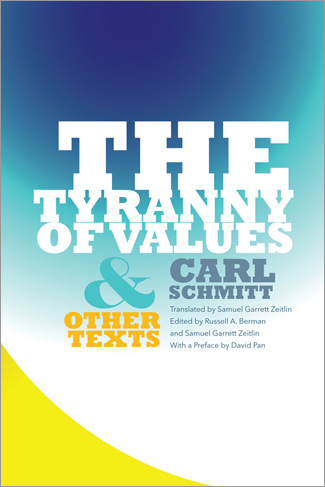By Telos Press · Monday, August 29, 2022 Forthcoming in Educational Philosophy and Theory is a collection of reviews of Timothy W. Luke’s recent book The Travails of Trumpification, published by Telos Press Publishing. Excerpts from the reviews appear below, and the full set of reviews can be read here (subscription required). Save 20% on the paperback edition of The Travails of Trumpification by purchasing it in our online store and using the coupon code BOOKS20 during checkout.
Continue reading →
By Telos Press · Monday, February 22, 2021 In the Spring issue of American Affairs, Blake Smith writes at length about Carl Schmitt’s “The Tyranny of Values,” the title essay of the collection The Tyranny of Values and Other Texts, published by Telos Press. Edited by Russell A. Berman and Samuel Garrett Zeitlin, translated by Samuel Garrett Zeitlin, and with a preface by David Pan, Schmitt’s The Tyranny of Values and Other Texts is now available for purchase in our online store. Save 20% off the list price by using the coupon code BOOKS20 during the checkout process.
An excerpt from the review:
 To those familiar with his most famous writings, it may seem that Carl Schmitt is an enemy of liberalism. In texts such as The Concept of the Political (1932) and Legality and Legitimacy (1932), Schmitt critiqued the Weimar Republic and the liberal tradition, the weaknesses of which Weimar seemed to embody. Liberalism, Schmitt argued, depends on systematic neutralizations—fictions by which all individuals and points of view are imagined to be equal, and by which the confrontations of political life seem to be transformed into peaceful, rule-governed debates with open-ended, undetermined outcomes. His writings during the Nazi era endorsed a new understanding of politics in which such deceptive procedures are replaced by the decisions of a charismatic leader who acts on behalf of a homogeneous people against its internal and external foes. Radicals of the Right and Left have found inspiration in Schmitt’s analysis of liberalism and calls for moving beyond it to a realistic and engaged theory that recognizes the insuperable conflicts at the heart of politics. To those familiar with his most famous writings, it may seem that Carl Schmitt is an enemy of liberalism. In texts such as The Concept of the Political (1932) and Legality and Legitimacy (1932), Schmitt critiqued the Weimar Republic and the liberal tradition, the weaknesses of which Weimar seemed to embody. Liberalism, Schmitt argued, depends on systematic neutralizations—fictions by which all individuals and points of view are imagined to be equal, and by which the confrontations of political life seem to be transformed into peaceful, rule-governed debates with open-ended, undetermined outcomes. His writings during the Nazi era endorsed a new understanding of politics in which such deceptive procedures are replaced by the decisions of a charismatic leader who acts on behalf of a homogeneous people against its internal and external foes. Radicals of the Right and Left have found inspiration in Schmitt’s analysis of liberalism and calls for moving beyond it to a realistic and engaged theory that recognizes the insuperable conflicts at the heart of politics.
Continue reading →
By Telos Press · Monday, December 7, 2020 The new issue of the journal New Political Science features a review symposium on Timothy W. Luke's Anthropocene Alerts: Critical Theory of the Contemporary as Ecocritique, published by Telos Press Publishing. For one week only, save 30% on your purchase of Anthropocene Alerts by using the coupon code ALERTS30 during checkout in our online store.
Continue reading →
By Telos Press · Wednesday, February 4, 2015 Writing at the Gatestone Institute website, Amir Taheri reviews Matthias Küntzel’s Germany and Iran: From the Aryan Axis to the Nuclear Threshold, available now from Telos Press Publishing:
In the past 50 years or so, the “special relationship” between Iran and Germany has been highlighted in numerous ways. The first German industrial fair held in a foreign country after the Second World War was hosted by Tehran in 1960 with Economy Minister Ludwig Erhard leading a delegation of over 100 German businessmen. After that, all German Chancellors, starting with Konrad Adenauer, made a point of visiting Iran until the fall of the Shah. Even after the mullahs seized power, Germans pursued the special relationship through high-level visits, including that of Chancellor Gerhard Schroeder. The only time the German Federal parliament approved a law unanimously was when it enacted legislation to guarantee investments in Iran.
Continue reading →
By Telos Press · Tuesday, September 9, 2014 Writing in today’s USA Today, Glenn Harlan Reynolds (aka Instapundit) reviews Joel Kotkin’s The New Class Conflict, just published by Telos Press. Order your copy in our online store.
 We’ve heard a lot of election-year class warfare talk, from makers vs. takers to the 1% vs. the 99%. But Joel Kotkin’s important new book, The New Class Conflict, suggests that America’s real class problems are deeper, and more damaging, than election rhetoric. We’ve heard a lot of election-year class warfare talk, from makers vs. takers to the 1% vs. the 99%. But Joel Kotkin’s important new book, The New Class Conflict, suggests that America’s real class problems are deeper, and more damaging, than election rhetoric.
Traditionally, America has been thought of as a place of great mobility—one where anyone can conceivably grow up to be president, regardless of background. This has never been entirely true, of course. Most of our presidents have come from reasonably well-off backgrounds, and even Barack Obama, a barrier-breaker in some ways, came from an affluent background and enjoyed an expensive private-school upbringing. But the problem Kotkin describes goes beyond shots at the White House. . . .
Continue reading →
|
|




